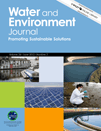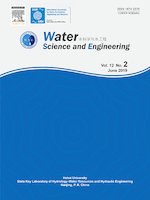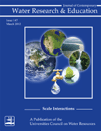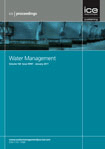
WATER AND ENVIRONMENT JOURNAL
Scope & Guideline
Empowering voices in water and environmental science.
Introduction
Aims and Scopes
- Water Quality Assessment:
Research on techniques and methodologies for assessing the quality of water bodies, including the detection of contaminants, pollutants, and pathogens. - Wastewater Treatment Technologies:
Innovations and advancements in technologies for treating wastewater, including biological, chemical, and physical processes aimed at improving effluent quality. - Water Resource Management:
Studies focusing on sustainable management practices for water resources, including allocation, conservation, and policies that support efficient use of water. - Impact of Climate Change:
Research examining how climate change affects water systems, including hydrological cycles, water availability, and the implications for water management. - Public Perception and Policy:
Exploration of public attitudes towards water use, conservation behaviors, and the effectiveness of policies aimed at improving water sustainability. - Microbial and Ecological Studies:
Investigations into the roles of microorganisms in water treatment processes and their ecological implications in aquatic environments. - Emerging Contaminants:
Research on the occurrence, fate, and treatment of emerging contaminants, such as pharmaceuticals and personal care products, in water systems.
Trending and Emerging
- Integration of Machine Learning in Water Management:
There is a significant trend towards employing machine learning techniques for modeling and optimizing water treatment processes, demonstrating the importance of data-driven approaches in the field. - Nature-Based Solutions (NbS):
Research focusing on nature-based solutions for water treatment and management is on the rise, highlighting the effectiveness of using ecological processes to address water challenges. - Public Engagement and Behavior Change:
Increasing attention is being paid to understanding public perceptions and behaviors related to water use and conservation, indicating a shift towards more community-based approaches. - Microalgae Utilization in Wastewater Treatment:
The utilization of microalgae in wastewater treatment processes is gaining traction, reflecting a growing interest in sustainable and resource-efficient methods. - Impact of Microplastics and Emerging Contaminants:
There is an increasing focus on the assessment and treatment of microplastics and other emerging contaminants in water bodies, indicating a shift towards addressing contemporary pollution challenges. - Climate Resilience in Water Systems:
Research aimed at enhancing the resilience of water systems to climate change impacts is emerging as a critical area of focus, reflecting the urgency of adapting to climate variability.
Declining or Waning
- Traditional Water Treatment Methods:
Research on conventional treatment methods for water purification appears to be declining as newer technologies and integrated approaches gain prominence. - Non-Technical Aspects of Water Management:
Studies focusing solely on non-technical aspects, such as community engagement without integration with technical solutions, are becoming less frequent. - Local Case Studies:
The journal has seen a decrease in the publication of localized case studies, possibly in favor of broader, more generalizable research findings that have wider applicability.
Similar Journals

Water Science and Engineering
Exploring the Depths of Water Research and EngineeringWater Science and Engineering, published by ELSEVIER, is a premier open access journal that has been disseminating vital research in the realms of civil and structural engineering as well as ocean engineering since 2008. With its ISSN 1674-2370 and E-ISSN 2405-8106, this journal plays a crucial role in advancing knowledge and innovation within the sector, evidenced by its impressive rankings in Scopus—holding the 15th position out of 105 in Ocean Engineering and 76th out of 379 in Civil and Structural Engineering, placing it in the 86th and 80th percentiles, respectively. Attaining a Q1 classification in both categories for 2023 highlights its importance and influence in the academic and professional communities. The journal addresses a broad spectrum of topics integral to water sciences, offering significant insights for researchers, professionals, and students alike. With a convergence period spanning from 2010 to 2024, it continues to explore contemporary issues and advancements, providing a pivotal platform for the dissemination of research. The journal is accessible to a global audience, reaffirming its commitment to fostering open access and enhancing accessibility to vital scientific literature.

E-Water
Championing Environmental Sustainability in Water PracticesE-Water, published by the European Water Association, is a leading academic journal focused on the multifaceted field of water resource management and environmental sustainability. With the ISSN 1994-8549, this journal serves as a vital platform for researchers, professionals, and students dedicated to advancing knowledge in water science and related areas. Although currently not an Open Access journal, E-Water provides in-depth peer-reviewed articles, ensuring high-quality research dissemination. The journal is committed to showcasing innovative studies on water quality, conservation, and policy-making, making significant contributions to the field of water management both locally and globally. As water scarcity and environmental challenges continue to rise, E-Water stands as an essential resource for those involved in the stewardship of our most vital natural resource.

Water Practice and Technology
Navigating the Future of Water Management and TechnologyWater Practice and Technology is a distinguished open-access journal published by IWA PUBLISHING, dedicated to disseminating cutting-edge research and practical insights within the field of water science and technology. With an E-ISSN of 1751-231X, the journal has been at the forefront of sharing knowledge since its inception in 2011 and has transitioned to open access in 2021, providing unrestricted access to high-quality research articles. Based in the United Kingdom, this journal plays a vital role in advancing the understanding of water resource management, treatment technologies, and environmental sustainability. As of 2023, it is categorized in the Q3 quartile for Water Science and Technology with a Scopus rank of #157/261, placing it in the 40th percentile among its peers. Researchers, professionals, and students alike will find the journal a valuable resource for the latest trends, innovations, and practical applications in the water sector, facilitating a collaborative approach towards addressing global water challenges.

Journal of Contemporary Water Research & Education
Navigating the Future of Water Resources TogetherJournal of Contemporary Water Research & Education is a leading publication in the field of water resources, committed to advancing the understanding and management of water-related issues through innovative research and education. Published by WILEY, this journal serves as a vital platform for researchers and practitioners to disseminate knowledge on contemporary water challenges, management strategies, and environmental policies. With an ISSN of 1936-7031 and an E-ISSN of 1936-704X, it provides a wealth of peer-reviewed articles that are essential for anyone interested in sustainable water resource practices. Although it does not currently operate under an open-access model, the journal's comprehensive content remains accessible through various institutional and personal subscriptions. As we face increasing water scarcity and quality issues globally, the Journal of Contemporary Water Research & Education strives to foster collaboration and innovation, playing a pivotal role in equipping scholars, professionals, and students with the knowledge necessary to tackle these pressing challenges.

PROCEEDINGS OF THE INSTITUTION OF CIVIL ENGINEERS-WATER MANAGEMENT
Exploring Innovations in Civil Engineering Water PracticesPROCEEDINGS OF THE INSTITUTION OF CIVIL ENGINEERS-WATER MANAGEMENT is a prestigious journal published by Emerald Group Publishing Ltd, dedicated to advancing the field of water management within civil engineering. With an ISSN of 1741-7589 and an E-ISSN of 1751-7729, this journal delivers peer-reviewed research that spans the critical intersections of water science and technology, contributing valuable insights into sustainable water management practices. As evidenced by its ranking in the 2023 Scopus categories, where it holds the Q3 quartile in Water Science and Technology, and a respectable position among its peers, the journal remains a vital resource for researchers, professionals, and students in the field. Though it is not an open-access journal, it offers accessible subscription options that facilitate worldwide dissemination of knowledge, enhancing its role as a fundamental reference point for cutting-edge developments in water management. For those looking to publish or stay updated on the latest research trends, this journal serves as an essential platform for promoting innovation and sustainable practices in civil engineering and water resources management.

Water Resources and Industry
Connecting Academia and Industry for Water InnovationWater Resources and Industry, published by Elsevier, stands at the forefront of research in the critical fields of water science and technology, as well as geography, planning, and development. With an impressive 2023 impact factor that places it in the Q1 category for both Geography and Water Science on a global scale, this journal is a vital resource for academics, professionals, and students seeking to advance their understanding of water-related issues impacting industries worldwide. Since its inception in 2013 as an Open Access journal, it has fostered innovative research and practical solutions to challenges in water resource management. Located in the vibrant academic hub of Amsterdam, the journal encourages submissions that cover a broad spectrum of topics, from sustainable practices and policy development to technological advancements in water treatment and distribution. By making its research publicly accessible, Water Resources and Industry not only contributes to scholarly discourse but also empowers stakeholders to implement evidence-based strategies for water sustainability, thereby enhancing its relevance and impact in today's world.

WATER RESOURCES MANAGEMENT
Empowering Research for a Thirsty WorldWATER RESOURCES MANAGEMENT is a prestigious journal published by SPRINGER, renowned for its contribution to the fields of Civil and Structural Engineering as well as Water Science and Technology. Operating since 1987, this journal has established itself as a vital resource for researchers, professionals, and students alike, boasting a remarkable impact factor and a Q1 designation in both relevant categories as of 2023. The journal is indexed in Scopus, achieving commendable ranks—34th in Environmental Science and 62nd in Civil and Structural Engineering, placing it in the top percentiles of its fields. Although it does not offer open access, WATER RESOURCES MANAGEMENT serves as a comprehensive platform for disseminating innovative research, discussions, and case studies that address the global challenges of water resource management. With a commitment to fostering knowledge and advancing the understanding of integrated water management solutions, this journal is indispensable for anyone engaged in these critical scientific domains.

Water Conservation Science and Engineering
Empowering Global Efforts in Water ConservationWater Conservation Science and Engineering, published by SPRINGERNATURE, is a vital academic journal dedicated to advancing the fields of environmental engineering, ocean engineering, waste management, and water science and technology. Since its inception in 2016, the journal has quickly established itself within the academic community, achieving a commendable Q3 ranking across multiple categories in 2023. With an ISSN of 2366-3340 and an E-ISSN of 2364-5687, it is accessible to a global readership eager to explore the latest research and innovations in water conservation and sustainable practices. Although currently not open access, the journal is committed to publishing high-quality scholarly articles that provide insights into effective water management strategies, innovative engineering solutions, and the critical importance of preserving our water resources. Based in Singapore, Water Conservation Science and Engineering aims to foster interdisciplinary collaboration among researchers, professionals, and students, making it an essential resource for anyone passionate about environmental sustainability and preservation.

Asian Journal of Water Environment and Pollution
Advancing sustainable solutions for water challenges.Asian Journal of Water Environment and Pollution is a leading academic journal published by IOS PRESS, dedicated to advancing the field of water science and technology, as well as pollution management. With its ISSN 0972-9860 and E-ISSN 1875-8568, this journal serves as a pivotal platform for researchers, professionals, and academics alike who are keen to explore innovative solutions and interdisciplinary approaches toward water-related challenges and environmental issues. Although currently positioned in the Q4 category for both pollution and water science & technology, the journal aims to foster impactful research and discussions that can enhance the understanding and treatment of water pollution. The Asian Journal of Water Environment and Pollution not only plays a crucial role in disseminating knowledge but also encourages the sharing of findings from unique geographic perspectives, particularly from Asia. As the field evolves, this journal is poised to become a vital resource for those looking to contribute to sustainable water management practices and pollution reduction strategies.

Water
Pioneering research at the intersection of water and environment.Water, an esteemed journal published by MDPI, serves as a pivotal resource for global research in the fields of aquatic science, biochemistry, geography, and water science and technology. Since its inception in 2009, this open-access journal has committed itself to advancing knowledge regarding water-related topics by fostering a platform that encourages the dissemination of high-quality research. With its impressive impact factor reflecting its relevance and influence, Water ranks in the top quartiles in various categories, including Q1 in Aquatic Science and Water Science and Technology, showcasing its commitment to publishing cutting-edge findings that resonate deeply with the environmental and biological sciences community. Located in Basel, Switzerland, the journal prioritizes accessibility for researchers, professionals, and students alike, aligning with the broader scientific goal of addressing urgent water challenges through collaborative and interdisciplinary research.